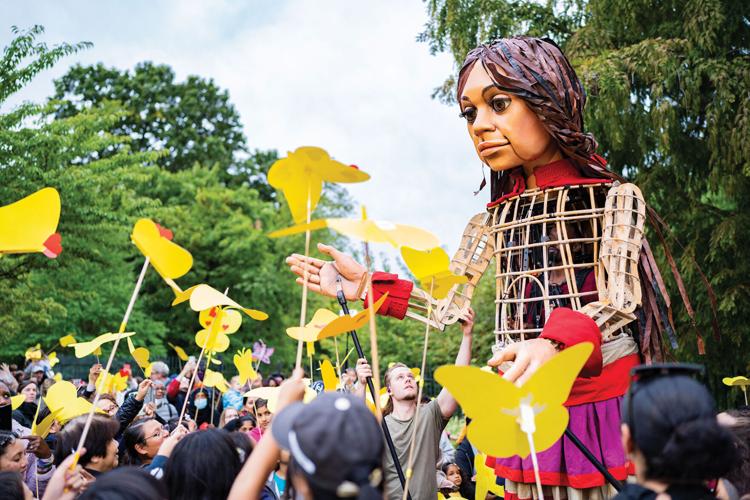
Photo courtesy of The Walk Productions, Respective Collective
Little Amal may represent a very small girl, but this 12-foot puppet of a 10-year-old Syrian refugee carries a big message of compassion and hope for displaced people everywhere.
Part of an extraordinary global arts project called The Walk, Amal — whose name means “hope” in Arabic — is manipulated by four puppeteers, including one on stilts, and was designed and built by Handspring Puppet Company, the creative force behind the internationally acclaimed play War Horse. She began her journey at the Syrian border in 2021, and has since visited more than 15 countries. Currently working her way across the United States from Boston to San Diego, Little Amal arrives at Nashville’s Centennial Park this week, and will be welcomed with a free community performance hosted by OZ Arts.
“Centennial Park is such a beautiful space for people to come together, and I think that’s really one of the biggest parts of this effort,” says Nashville choreographer Shabaz Ujima, who is directing the performance. “As Amal walks from place to place, crossing the continents, she is searching for a space to call home. So we wanted to create an opportunity for people to gather, and to show her that here in Nashville, she has a community that cares for her.”
Ujima describes the event as “an intergenerational community celebration that shows Little Amal’s journey of weathering a storm as she tries to find home.” The huge project features choreography from Ujima and frequent collaborator Thea Jones, while showcasing community partners such as the Centennial Park Conservancy, Conexión Américas, Shackled Feet Dance, Global Education Center, Celebrate Nashville and more.
“It was important to me that we include a wide range of organizations that are not only dedicated to the beauty of art and dance, but also to the beauty of humanity,” Ujima says. “So I think what excites me most is the fact that we’re going to have such a wide range of people, who are able to move and express themselves with their bodies. We’re going to have children from the age of 6 or 7 from Centennial Performing Arts. We’re going to have elders from Shackled Feet Dance. We’re going to have people from Friends Life Community, which is a group of individuals with disabilities. We’re going to have what I believe is a true village that represents all of Nashville.”

Ujima says he is particularly excited to “showcase the power of girls,” pointing to the strength and resilience of refugee children such as Amal.
“I wanted to stay true to who Little Amal is — a 10-year-old child,” he says. “When you think about what these displaced children and families are going through — these are things we will never truly understand. But there’s something about Little Amal that allows us to connect with her story. Children, especially, are just so willing to let go of the things that make us different in order to connect — and that’s important to the story we’re going to share here.”
As associate artistic director with Little Amal’s walk across America, Enrico Dau Yang Wey has seen many examples of such connection over the past two years.

“I think one of our puppeteers said it best: ‘This is often a tour, not of places, but of people,’” says Wey, who’s been with the Amal team since the first workshop in London in 2019. “The community events can be very impactful, but the things that really stick with me are the intimate little moments where people are interacting with Amal. I remember a little girl in Turkey who walked up and said: ‘My name is Amal, too.’ Or when we were in the middle of an event at the New York Public Library, and I saw a man holding back tears. You don’t know what these people’s stories are, or why they’re feeling this way, but we asked Amal to just walk over to him and put a hand on his shoulder — it was really powerful.”
While the arts have long provided a way to promote connection and build empathy, Wey sees puppetry as being particularly effective, because it asks us to “fill in the story.”
“As a puppet, Amal creates a collective empathetic response,” he says. “You start thinking: ‘Oh, I think she’s cold or hungry, or looking for a place to sleep tonight.’ And once you begin that process, you’re immediately connected. When you’re watching a human actor, you don’t necessarily feel that need to fill in the blanks for them. But there’s something about Little Amal — she sort of becomes a vessel for everyone’s stories. And when she leaves Nashville, she’ll carry those with her wherever she goes.”




